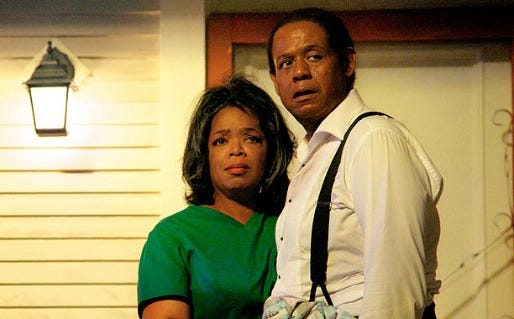Lee Daniels' The Butler

What could have been a searing portrait of race relations in America seen through the eyes of a longtime White House butler instead becomes something like a cheap "Forrest Gump" knockoff.
"Lee Daniels' The Butler" is loosely based on the life of real White House butler Eugene Allen, who served eight presidents from 1952 to 1986. He was a witness to the tumultuous events of the mid-20th century, from school integration to the civil rights upheaval and Vietnam.
Director Daniels and screenwriter Danny Strong, who based the movie on a Washington Post article by Wil Haygood, use this as a basis for the completely fictionalized persona of Cecil Gaines, played by Forest Whitaker. While it starts out as a strong character portrait, it soon morphs into a hard-to-believe sequence of events in which either Cecil or his son is present, Zelig-like, at every single pivotal moment in the civil rights movement.
(And yes, the official title is "Lee Daniels' The Butler" -- the studio even sent out a stern reminder to that effect. Personally I think including the name of a director or author in the title makes them seem incredibly insecure.)
Even worse was the choice to cast well-known actors as the presidents Cecil served. Most of the time they bear not a whit of physical resemblance to the Oval Office occupant they're supposed to represent, and their attempts to mimic their speech or mannerisms fall short. Thus, Robin Williams' Eisenhower seems pinched and feisty, while John Cusack as Nixon (!!) has an itchy, sad quality.
Liev Schreiber does an amusing through pretty standard LBJ parody, and James Marsden adds a New England warp to his vowels as Kennedy. Alan Rickman's Reagan is probably the best of the lot, capturing the Gipper's unseen warmth. Casting Jane Fonda as Nancy Reagan seems like some sort of cruel in-joke, especially when she invites Cecil and his wife to attend a state dinner as their guests just so (it's implied) there will be some diversity in the room.
The main problem with the churning of administrations is none of them hang around long enough to make any substantial impression, so these appearances end up falling just north of cameos. One part where Cecil attends to Jackie Kennedy after the assassination, her clothes still stained with JFK's blood, is a cheap and false moment.
The movie is at its best when it peers at the relationship between Cecil, his often-troublesome marriage to his boozy wife Gloria (Oprah Winfrey), his children and his co-workers. Cuba Gooding Jr. plays the prankster head butler, and Lenny Kravitz is the more sedate wingman. The scenes where the White House staff hang out in the kitchen and back areas are lively and insightful, contributing to an Upstars/Downstairs vibe.
I enjoyed the section where Cecil talks about the two faces of the black house servant. You wear one face that is your own at home and among friends, but when white folks are around you must be non-threatening, indeed a non-entity -- "the room should feel empty when you are in it," Cecil learns.
He even manages to land his White House gig through strident obsequiousness. When a white manager suggests him to the black head butler, the latter takes affront -- and Cecil sides with him, saying he's right to want to hand-pick his own staff. Impressed with the way Cecil can disappear inside himself, he hires him on the spot, commenting that he'll "be a good house n*gger."
The part where Cecil tangles with his oldest son Louis (David Oyelowo) over his evolution into a civil rights activist grows increasingly far-fetched. Louis manages to be at the forefront of virtually every iconic scene from the equal rights movement -- getting beat up at a diner sit-in, having police dogs and firehouses trained on him, being nearly burned alive on a torched Freedom Rider bus, even seguing into the nascent Black Panther movement.
Curiously, the moment when the civil rights era arrives on Cecil's doorstep, the 1963 march on Washington by Dr. Martin Luther King Jr. and others, is not represented.
I think this ambitious film would have been better off as a rumination on the different paths African-Americans have taken toward equality and respect -- the way of the harsh revolutionary vs. the quiet insider. Instead, its story and emotions wander all over the map of the black experience, never finding a home.
3.5 Yaps



